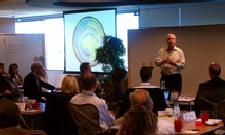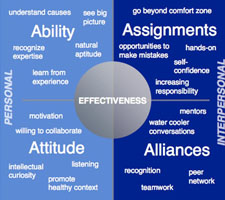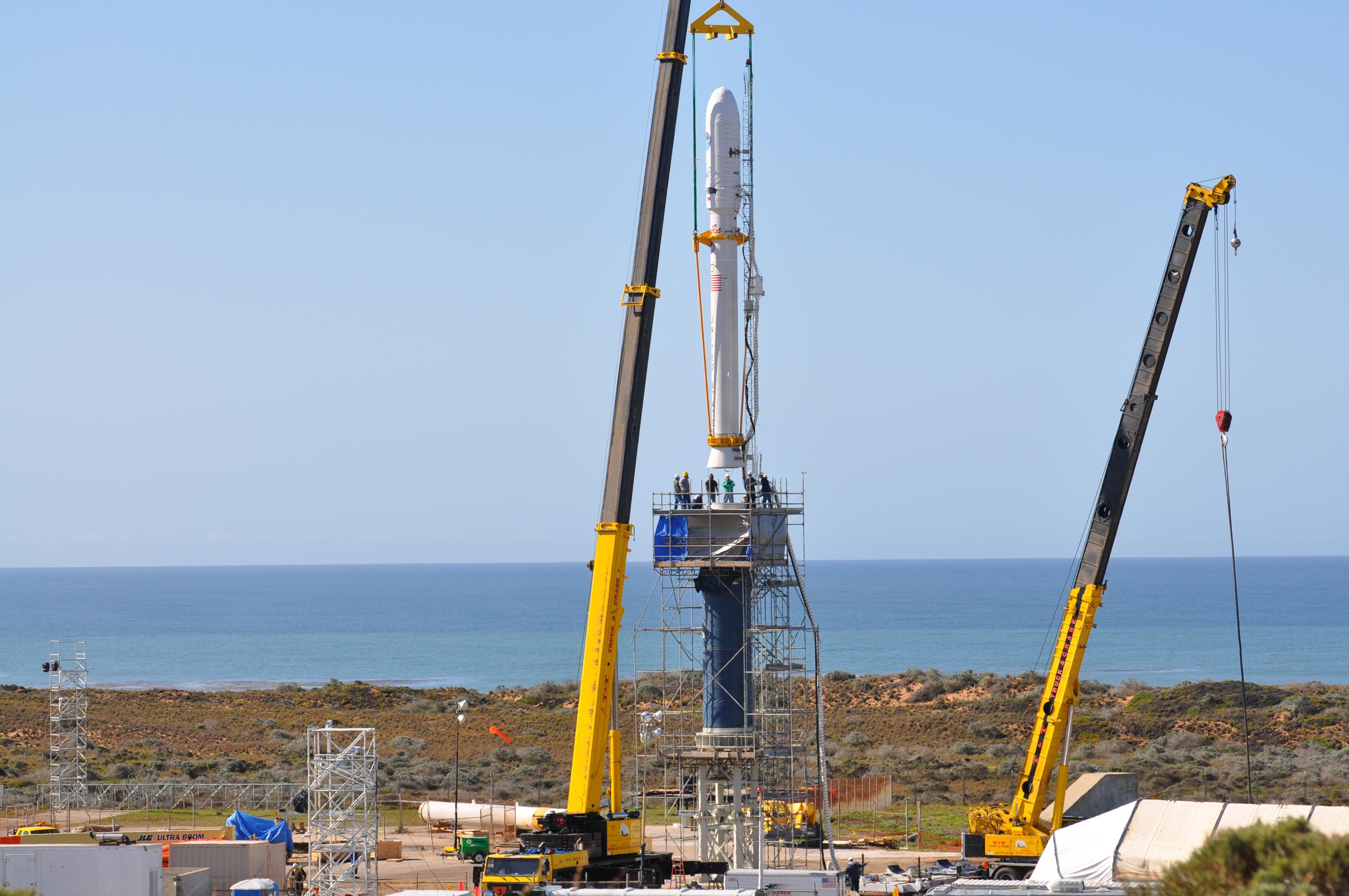May 10, 2011 Vol. 4, Issue 3
Government, industry, and academic partners explored the topic of effective learning in organizations at the Academy’s fourth knowledge forum.
The NASA Academy of Program/Project & Engineering Leadership, along with co-host MWH Global, brought together knowledge experts from NASA centers and members of industry and academia for the Academy’s fourth NASA Knowledge Forum in April. MWH hosted the event at their Learning Center in Broomfield, Colorado.

Ed Hoffman, director of the NASA Academy, presents to the Knowledge Forum #4 audience about the trends shaping the knowledge in projects. Credit: NASA APPEL
In the spirit of “the practitioner knows best,” participants shared stories and ideas about the challenges and successes of using knowledge in projects. As projects become more globally distributed, there is an increasing demand for organizations to enable their workforces to transfer and learn valuable knowledge effectively.
Bob Uhler, CEO and chairman of MWH Global, welcomed the forum participants. Being a learning organization is not easy, he said. “It’s [about] having the courage to keep making mistakes,” said Uhler. “Everything we’ve ever done had five failures before we got a success.” Dr. Ed Hoffman, director of the NASA Academy, identified three major trends that are driving the project world: transparency, frugal innovation, and smart networks. (See Trends in Project Management for more on this topic.)
“We are learners,” said Betsy Redfern, chief learning officer at MWH Global. “We learn new things all the time.” The challenge is to translate the context of global events and trends into teachable best practices, skills, and lessons to the workforce. A group activity followed by a reflection revealed to the group that the techniques that made learning a new skill effective included visual instructions, repetition and practice, an incremental approach, fun, and an understanding that failure was inevitable and allowed.

Beginning in 2007, the NASA Academy asked over 275 practitioners, “How do you become effective at what you do?” The responses, collected in group activities over several Academy Masters Forums, led to the identification of four factors that shape personal effectiveness: ability, attitude, assignments, and alliances. Credit: NASA APPEL
Beginning in 2007, the NASA Academy asked over 275 practitioners, How do you become effective at what you do? The responses, collected in group activities over several Academy Masters Forums, led to the identification of four factors that shape personal effectiveness: ability, attitude, assignments, and alliances. Credit: NASA APPEL
Matt Kohut, communications lead for the NASA Academy, recounted the findings of a qualitative study of personal effectiveness at NASA. Beginning in 2007, the NASA Academy asked over 275 practitioners, “How did you become effective at what you do?” The responses, collected in group activities over several Academy Masters Forums, led to the identification of four factors: ability, attitude, assignments, and alliances. Kohut facilitated a group activity to explore how organizations enable their people to develop these “Four A’s” throughout their careers. (Share your insights, stories, and thoughts about this on the NASA Academys Facebook Page.)
Larry Prusak, editor-in-chief of ASK Magazine, and Don Cohen, managing editor of ASK Magazine, hosted a panel on learning for knowledge effectiveness with: Richard McDermott, McDermott Consulting; Joe Horvath, Millennium: The Takeda Oncology Company; and Nancy Dixon, founder of Common Knowledge Associates. Gaining a deeper understanding of how effective learning takes place within organizations is perhaps more challenging than other areas of knowledge management. Employees are overwhelmed with information, a portion of which they will read, a portion of which they will understand, and a portion of which they will act on. “This speaks to how resourceful we need to be if we’re going to achieve some of the goals that we have in knowledge management,” said Horvath.
T.J. Elliot, chief learning officer at the Educational Testing Service, shares his ideas during a group discussion about the Academy’s “Four A’s.” Credit: NASA APPEL
Horvath shared a story about a woman who contacted him regarding updating her information in their learning management system. Horvath sent her instructions, and found it odd that she was unaware of how to do this since she had taken the training rather recently. “It was telling about our assumptions of putting information in front of people and assuming they absorbed it,” said Horvath. “I think we still underestimate how likely our messages are to be filtered out.”
“I think the tools we have for managing knowledge are far more sophisticated than our skill for using them,” said McDermott. “If anyone is going to figure out how to cope with it, it’s us.” Dixon agreed. “We have great practices, but I don’t think we have an overarching theory about knowledge and what sorts of practices are useful for different types of knowledge.”
Another challenge is what Prusak termed “the erosion of cognitive authority,” which leads to a need to distinguish between canonical or authoritative knowledge and collaborative knowledge that arises from the global community, which requires vetting. Forum participants agreed that efforts will be needed to train organizations to be better at evaluating the quality and sources of knowledge.







